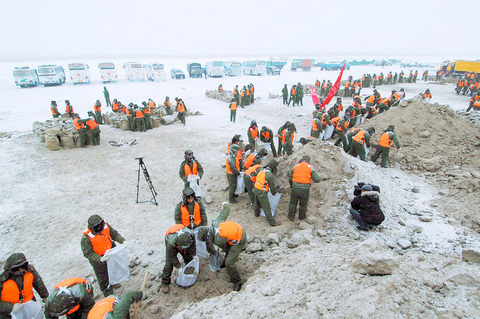China's southern business capital of Guangzhou rushed to safeguard its water supply yesterday as a toxic spill from a smelter flowed toward the city of 7 million people just north of Hong Kong, state media said.
It was China's second environmental disaster in a month and came as authorities were trying to minimize the impact of a chemical spill on a northeastern river. That toxic slick disrupted water supplies to millions of people in China and has flowed into Russia.
Guangzhou and the nearby manufacturing center of Foshan were ordered to "start emergency plans to ensure safe drinking water supplies to their residents," the official Xinhua News Agency said.

PHOTO: EPA
The report didn't say what the cities were told to do.
The area is one of China's most densely populated and a center for the factories that supply its booming export industries.
The spill into the Bei River north of Guangzhou prompted another city, Shaoguan, to cut running water for eight hours on Tuesday. The Bei flows into the Pearl River, which passes through Guangzhou and empties into the South China Sea west of Hong Kong.
A woman who answered the phone at the press office of Guangzhou's water department refused to say whether it has cut running water or how many people might be affected.
But the woman said only one of Guangzhou's seven water plants is close enough to the river to be affected by the pollution. She would give only her surname, Zheng. Phone calls to the city government and environmental bureau yesterday morning weren't answered.
The government said the spill from a smelter in Shaoguan pushed up levels of the heavy metal cadmium in the Bei to 10 times acceptable limits.
The disaster came a month after a chemical plant explosion in China's northeast spewed 100 tonnes of benzene and other toxins into the Songhua River, forcing the major city of Harbin to shut down running water.
In Russia, authorities said the toxic slick could reach Khabarovsk, a city of 580,000 people, as early as yesterday. The city already has shut down running water in some areas as a precaution and warned all residents not to drink tap water.
Chinese Foreign Ministry spokesman Qin Gang (秦剛) defended Beijing's handling of the spill, saying yesterday it was trying to minimize the impact on Russia.
"We express our regret for the possible impact and difficulties the Russian side may have in dealing with this issue," Qin said.
"But we have been very quick to respond and to take measures to prevent or to minimize the pollution's impact in our cooperation with Russia," he said.
Beijing has sent activated carbon to Khabarovsk for use in water filtration plants and built a dam meant to keep the toxins out of another river used by the city.
In Yingde, a city north of Guangzhou and about 90km downstream from Shaoguan, Xinhua said authorities used 15 fire trucks and other vehicles to deliver water to urban areas.
Officials in Yingde were dumping water from a suburban reservoir into the river to dilute the toxins and were building a pipe from the reservoir to bring clean water into the city, Xinhua said.

IDENTITY: A sex extortion scandal involving Thai monks has deeply shaken public trust in the clergy, with 11 monks implicated in financial misconduct Reverence for the saffron-robed Buddhist monkhood is deeply woven into Thai society, but a sex extortion scandal has besmirched the clergy and left the devout questioning their faith. Thai police this week arrested a woman accused of bedding at least 11 monks in breach of their vows of celibacy, before blackmailing them with thousands of secretly taken photos of their trysts. The monks are said to have paid nearly US$12 million, funneled out of their monasteries, funded by donations from laypeople hoping to increase their merit and prospects for reincarnation. The scandal provoked outrage over hypocrisy in the monkhood, concern that their status

Trinidad and Tobago declared a new state of emergency on Friday after authorities accused a criminal network operating in prisons across the country of plotting to kill key government officials and attack public institutions. It is the second state of emergency to be declared in the twin-island republic in a matter of months. In December last year, authorities took similar action, citing concerns about gang violence. That state of emergency lasted until mid-April. Police said that smuggled cellphones enabled those involved in the plot to exchange encrypted messages. Months of intelligence gathering led investigators to believe the targets included senior police officers,

The United States Federal Communications Commission said on Wednesday it plans to adopt rules to bar companies from connecting undersea submarine communication cables to the US that include Chinese technology or equipment. “We have seen submarine cable infrastructure threatened in recent years by foreign adversaries, like China,” FCC Chair Brendan Carr said in a statement. “We are therefore taking action here to guard our submarine cables against foreign adversary ownership, and access as well as cyber and physical threats.” The United States has for years expressed concerns about China’s role in handling network traffic and the potential for espionage. The U.S. has

A disillusioned Japanese electorate feeling the economic pinch goes to the polls today, as a right-wing party promoting a “Japanese first” agenda gains popularity, with fears over foreigners becoming a major election issue. Birthed on YouTube during the COVID-19 pandemic, spreading conspiracy theories about vaccinations and a cabal of global elites, the Sanseito Party has widened its appeal ahead of today’s upper house vote — railing against immigration and dragging rhetoric that was once confined to Japan’s political fringes into the mainstream. Polls show the party might only secure 10 to 15 of the 125 seats up for grabs, but it is